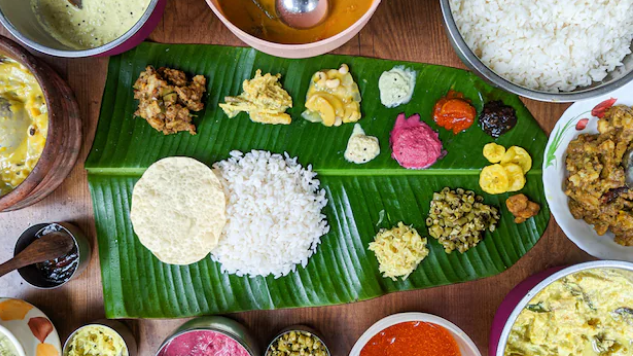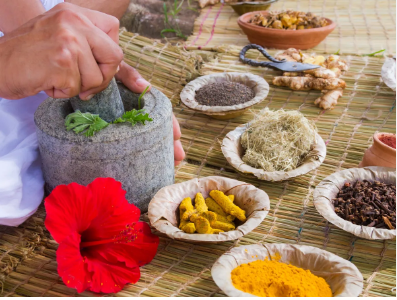
India has always been known for its rich food culture and natural healing practices. Ancient Indian wisdom, especially from traditions like Ayurveda, has always focused on how food can be used as medicine. Long before modern science spoke about gut health, metabolism, and detox, Indian households were already following food habits that supported everyday wellness. These habits are not only time-tested but are now also backed by modern experts. Let’s explore how these ancient Indian food habits can still help you stay healthy today.
Start Your Day with Warm Spiced Water
One of the most simple and powerful Indian habits is starting your day with a glass of warm water infused with spices like turmeric, cumin, or ginger. This age-old practice helps the body wake up naturally and flush out toxins. Experts say that this boosts metabolism, aids digestion, and helps in improving immunity. Drinking warm water with turmeric and black pepper, or even jeera (cumin) water, first thing in the morning, is a gentle and effective way to activate your system. These ingredients are packed with anti-inflammatory and detoxifying properties that support your health every day.
Ghee – The Golden Fat of India
In Indian homes, ghee is not just food, it’s considered a form of liquid gold. Used for generations, this clarified butter is full of healthy fats and essential fat-soluble vitamins like A, D, E, and K. It helps in better nutrient absorption, improves gut health, and supports joint mobility. According to Ayurveda, ghee is a “sattvic” food, meaning it promotes mental clarity and calmness. Modern experts agree that ghee is one of the best natural fats you can include in your diet, especially when used in moderation. Whether you add it to your dal, roti, or rice, ghee enhances both taste and health.
Follow the Season: Ritu Ahar
Another powerful Indian food tradition is eating seasonal and local produce, known in Ayurveda as Ritu Ahar or Ritucharya. The idea is simple—our body changes with each season, and nature provides exactly what we need during that time. For example, during summer, fruits like watermelon and cucumber help in cooling down the body, while in winter, foods like jaggery, sesame seeds, and root vegetables provide warmth and energy. Eating seasonally helps your body stay balanced, healthy, and immune to seasonal illnesses. Modern nutritionists now strongly recommend following this traditional wisdom to maintain holistic wellness.
Spices That Heal
Indian kitchens are known for their colorful and aromatic spices, but these are not just for flavor. Spices like turmeric, black pepper, cinnamon, cardamom, and cloves are actually full of healing properties. These ingredients have been used in India for centuries to boost digestion, reduce inflammation, and fight infections. For example, turmeric contains a compound called curcumin, which has powerful anti-inflammatory effects and is now studied worldwide for its healing benefits. Experts suggest that these spices also improve blood circulation and immune function, making them a natural medicine you can enjoy daily.
Eat with Awareness: Bhojan Vidhi
In ancient India, eating was never rushed. The concept of Bhojan Vidhi, or mindful eating, teaches us to eat slowly, with gratitude and focus. Instead of watching TV or scrolling through your phone, traditional Indian meals were eaten in silence or with gentle conversations. This habit improves digestion, prevents overeating, and helps in building a better connection with food. Experts say that being present while eating allows the brain to fully register the flavors and signals of fullness, making it easier to maintain a healthy weight and mindset. Eating mindfully is a small change that can have a big impact on your health.
Fermented Foods for Gut Health
Fermented foods have always been a part of Indian kitchens. Whether it’s curd, buttermilk (chaas), pickles, dosa, idli, or kanji, these dishes naturally support gut health. These foods are rich in probiotics, the good bacteria that help in digestion and keep your stomach healthy. A balanced gut improves your immunity, enhances nutrient absorption, and even supports mental well-being. Experts believe that gut health is the root of overall wellness, and Indian fermented foods offer a simple, tasty, and natural way to take care of it. Including a bowl of curd or a glass of buttermilk in your daily meals can make a real difference.
Fasting: A Natural Reset
Fasting has been a part of Indian culture for both spiritual and health reasons. Practices like Ekadashi fasting, Navratri vrat, or even weekly fasts allow the body to rest, repair, and reset. Today, many doctors recommend intermittent fasting, which aligns well with traditional Indian habits. Fasting helps in detoxification, improves metabolism, reduces inflammation, and supports better blood sugar control. Experts also note that fasting improves mental clarity and focus. Even fasting for just one day a week, or following a simple time-restricted eating routine like 16:8 (16 hours fast, 8 hours eating), can improve your health without any medicines.
Ancient Indian food habits are more than just traditions—they are practical, science-backed ways to live better every day. These habits are rooted in balance, natural healing, and self-awareness. In a world full of processed foods and quick fixes, returning to our traditional ways of eating can bring lasting health benefits.
From drinking spiced warm water in the morning, using ghee, and eating seasonally, to including spices, fermented foods, and practicing mindful eating and fasting, these small habits carry the power to transform your life.
You don’t need fancy diets or expensive supplements when your Indian kitchen already holds everything you need for daily wellness. By following these simple yet effective practices, you not only honor our ancient heritage but also take a big step towards a healthier, balanced, and happier lifestyle.


































